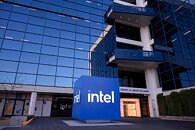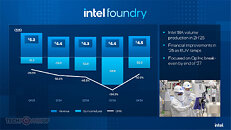- Joined
- Aug 19, 2017
- Messages
- 2,801 (1.02/day)
According to sources close to the Wall Street Journal, Intel is weighing preliminary acquisition offers that could split the company into two parts: product and foundry. TSMC and Broadcom are independently exploring deals that would divide Intel's chip design and manufacturing operations. Broadcom has initiated informal discussions regarding Intel's chip design and marketing divisions, while TSMC is considering assembling an investor consortium to acquire Intel's facilities. This solution is improbable, as Intel's fabs are strategically one of the most critical aspects of the US semiconductor supply chain. Intel manufactures custom chips for the US Department of Defense; hence, having a foreign owner of fabs is not acceptable. The news about the acquisition comes as Intel grapples with manufacturing setbacks, including a total $13.4 billion loss in its foundry segment during 2024 and a significant erosion of market share in the AI processor market.
The acquisition talks face substantial regulatory hurdles, particularly regarding national security concerns. The US government has signaled resistance to foreign ownership of Intel's domestic manufacturing capabilities, which are deemed strategically vital to American technological sovereignty. This could particularly impact TSMC's bid for Intel's plants despite the Taiwanese company's position as the world's leading contract chipmaker. Intel's vulnerability to acquisition follows a series of strategic missteps under former leadership, including delayed manufacturing innovations and an increasing reliance on government subsidies for facility expansion. The company's share price has declined 60% from its 2021 highs amid these challenges, attracting potential buyers despite the complexity of any potential deal structure. Successful execution would require navigating both regulatory approval and the practical difficulties of disaggregating Intel's deeply integrated design and manufacturing operations.


View at TechPowerUp Main Site | Source
The acquisition talks face substantial regulatory hurdles, particularly regarding national security concerns. The US government has signaled resistance to foreign ownership of Intel's domestic manufacturing capabilities, which are deemed strategically vital to American technological sovereignty. This could particularly impact TSMC's bid for Intel's plants despite the Taiwanese company's position as the world's leading contract chipmaker. Intel's vulnerability to acquisition follows a series of strategic missteps under former leadership, including delayed manufacturing innovations and an increasing reliance on government subsidies for facility expansion. The company's share price has declined 60% from its 2021 highs amid these challenges, attracting potential buyers despite the complexity of any potential deal structure. Successful execution would require navigating both regulatory approval and the practical difficulties of disaggregating Intel's deeply integrated design and manufacturing operations.


View at TechPowerUp Main Site | Source





